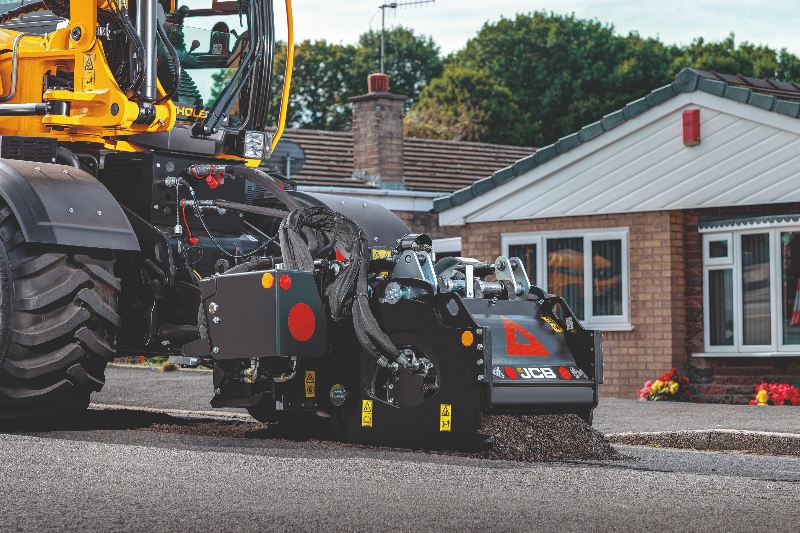

The poor condition of local roads is one of the most acute challenges that councils up and down the country are facing. According to the latest Annual Local Authority Road Maintenance (ALARM) survey by the Asphalt Industry Alliance (AIA), less than half (47%) of all local roads in England and Wales are in good structural condition. The remaining 53% have less than 15 years’ structural life left if appropriate measures are not taken to ensure they are well maintained.
The symptoms of our failing road system, the plague of potholes that lie behind the AIA’s survey, are a headache for residents and local authorities alike. JCB argue they have the cure: the Pothole Pro.
In a recent webinar, JCB Sales Manager Dan Jenner and General Manager Ben Rawding sat down with Paula Claytonsmith, Chief Executive of the Local Council Roads Innovation Group (LCRIG), and Stoke-on-Trent councillor Abi Brown to discuss the pothole challenge and JCB’s solution.
‘There is nothing more frustrating as an elected member than when you tell a resident a pothole will be repaired, the team repair the pothole, but then not long afterwards the resident contacts you to tell you it’s failing again,’ Cllr Brown tells the panel. ‘From a leadership point of view, you want to be sure that taxpayer’s money is being well spent, so you want to eradicate those moments when a repair is not good enough.’
These moments occur when a pothole is filled in without the area being properly prepared first. If you attempt to fill the hole on top of a damaged surface, then chances are a few months down the line it will open up again – much to the chagrin of the residents who first alerted their authority.
The Pothole Pro was designed to put a stop to this. It focuses on repairing the damage permanently. To achieve this, it first cuts away all the damaged road surface. It then crops the edges of the hole to ensure a solid structure before clearing away the loose debris. The reinstatement phase can then go ahead, and the hole is filled in.
The preparation stage – the cutting, cropping and cleaning – is key. It is this that ensures the fix will be permanent. As Ben tells the panel, ‘If you don’t do the preparation, if you don’t do the important first step and you jump straight to the reinstatement, it’s just simply not going to last. And that’s where you get the frustrated residents Abi mentioned.’
Why hasn’t there always been an emphasis on permanent repairs? Because the preparation stage can be time consuming, expensive and labour intensive, which means long periods of road closures, traffic jams and general discontent. According to JCB’s research, the preparation represented 70% of the time that operatives spent on site, and this was heavy, dirty work which took its toll on operatives. Something new was needed. ‘Innovation was required to speed up the preparation time,’ says Dan.
This is where the Pothole Pro comes in. It is fitted out with three dedicated attachments to cut, crop and clean a pothole in eight minutes, according to JCB, dramatically increasing the rate at which permanent road repairs can be made. According to Ben, it allows councils to fix potholes ‘4x quicker and at half the cost of traditional methods.’
Stoke-on-Trent City Council’s experience with JCB’s innovative machine has certainly been positive. ‘Seven years’ backlog of road repairs were done in the first 12 months of using the Pothole Pro,’ Cllr Brown says. Before taking delivery of the machine, 97% of Stoke’s pothole repairs had to be revisited within six months. After the Pothole Pro arrived, less than 1% required a return visit within six months. And to top it off, the city council also saw a 50% reduction in insurance claims resulting from potholes over a 12-month period.
‘We’re one of the first councils to use the Pothole Pro and to champion it with our residents,’ Cllr Brown explains. ‘I’ve also had a number of conversations with councils across the country who are interested in seeing it. I think it is very distinctive as a machine and unbelievably impressive to see in action.’
This innovative three-in-one machine has the potential to help a lot of cash-strapped local authorities look after their local roads. According to the AIA, an estimated £16.3bn is needed to tackle the backlog of road repairs. This is a steep hill to climb and so anything that might make the journey easier will be welcome to local councils.
This article first appeared in the Spring issue of LAPV. To subscribe for free click here.